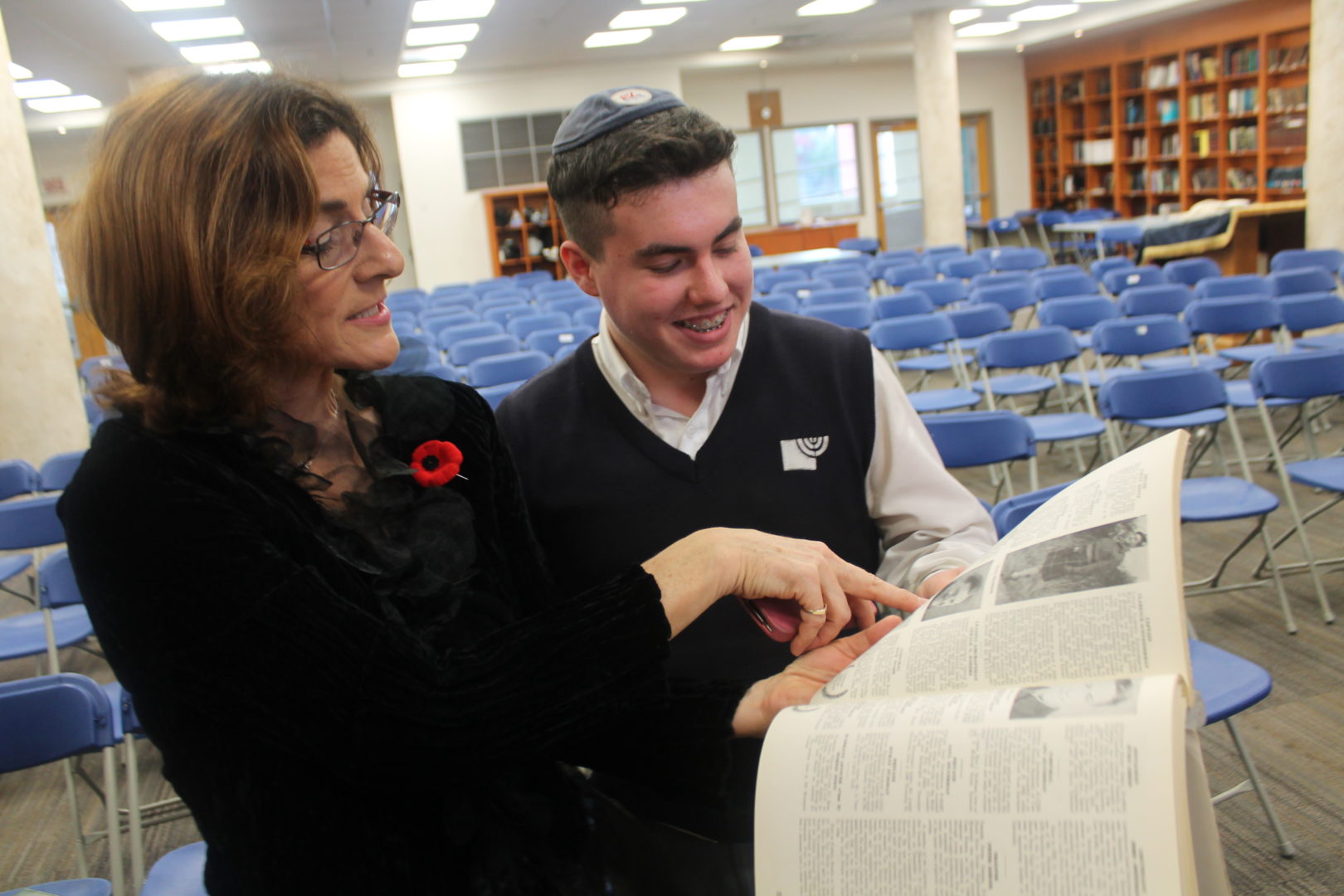Matthew Silver, a Grade 10 Hebrew Academy Montreal student, was surprised and proud to see a photo of his late grandfather shown to him by Ellin Bessner, author of the new book, Double Threat: Canadian Jews, the Military, and World War II.
The book is to be published on Nov. 11 – Remembrance Day – by New Jewish Press. A Toronto-based journalist and Montreal native, Bessner reminds today’s young people that thousands of Canadian Jews served during the Second World War, fighting in its battles and dying in the hundreds.
Bessner, a journalist who’s now teaching at Centennial College, spoke to Grade 10 and 11 students at Hebrew Academy. Her visit was one of several stops at Jewish day schools that were organized by the Centre for Israel and Jewish Affairs (CIJA) and the Bronfman Jewish Education Centre.
“At least 17,000 Canadian Jewish men and women served in the Second World War,” said Bessner. “I think that’s a record that needs to be recognized and talked about and celebrated. Probably about 2,000 more service men and women were Jews that we don’t know about, because many people were afraid to publicize their religion on paper when they enlisted.”
She highlighted how those who did identify themselves as “Jewish” or “Hebrew” maintained their Jewish traditions and practices while serving. Included in her presentation was a picture of soldiers conducting a Passover seder and a video of a veteran mentioning the Hebrew-Yiddish Bible.
Bessner also passed around items from the war, including a Canadian comic book celebrating war heroes, one issue of which was dedicated to Jewish heroes.
READ: JEWISH VETS HONOURED 70 YEARS AFTER END OF WWII
Another item was the book Canadian Jews in WWII, Casualties, which was published in 1947 by the Canadian Jewish Congress.
That’s where Matthew discovered the picture of his grandfather, Abraham Silver, a trooper in the Royal Montreal Regiment. The book describes how he was injured twice – once in France and again in Germany.
He was reported wounded in action on Aug. 2, 1944, in the fighting at Hill 195 (Falaise Gap), after 10 hours of continuous battle. The second time was on March 9, 1945, while he helped evacuate wounded soldiers during the siege of Veen, Germany.
Bessner related that she encouraged Veterans Affairs Canada to update its website, after she found that it “makes no mention of Jews,” while acknowledging the contributions of First Nations, Chinese and black people who served in the Canadian Army.
“Jews participated in disproportionately high numbers in the war efforts of the First and Second World Wars,” CIJA Quebec vice-president Eta Yudin, a Hebrew Academy parent, told the students.
“Many of them sacrificed everything and paid with their lives so that we could live in peace and harmony. It is our duty to honour them and remember them.”
Bessner spent most of her career working at CTV and CBC as a reporter, anchor and producer. She was also a foreign correspondent based in Italy who covered three civil wars in Africa.
At Herzliah High School, from which she graduated, Bessner underlined the fact that many of those Canadian Jews who served were about the students’ age, or a little older.
In volunteering (conscription was only introduced near the end), they interrupted their studies or left their jobs, she said. Many signed over some of their $1.30-a-day wages to help their families at home.
Bessner encouraged the teens to imagine themselves in the place of those young Jewish Canadians – their conversations with friends and family, their questions about whether to sign up as Jews, how they would keep kosher, what their lives were like once in uniform.
She stressed that, as Jews, they were conscious of a special responsibility to defeat the Nazi threat to their fellow Jews, which became more urgent as the war progressed.
Among the Canadian Jews who fell – the Canadian Jewish Archives lists 577 – Bessner highlighted Joseph Gertel, who went to Talmud Torah, Herzliah’s elementary school. While serving in the Royal Canadian Artillery, he was killed in Normandy in July 1944.
Bessner also spoke at Bialik High School and Ecole Maïmonide.
Students from each of the schools are expected to participate in a Remembrance Day commemoration in the military section of the Baron de Hirsch Cemetery on Nov. 10. The names of all Canadian Jewish fallen are inscribed on a monument there.
